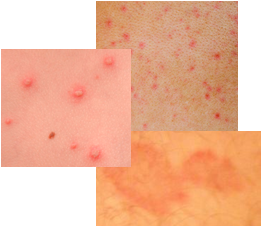- Home
- Sensitive
Sensitive Skin Care
Visit this
PICTURES OF RASHES PAGE
Sensitive skin care is an important topic for many people. Why? Unfortunately, it is because sensitive skin is fairly common in today’s population.
Sensitive skin is a condition that can be quite vague. For example, some people do not care for their skin properly or use harsh products. Usually, this results in some sort of ailment, leading the individuals to think that they have sensitive skin.
However, the above example is not the type of problem that this page is concerned with. Instead, this page deals with individuals who have skin reactions with only minor exposure to some sort of irritant. In this situation, the skin condition is very frustrating because the individual may be following healthy skin care procedures, but yet still suffer problems.
So then, what is sensitive skin? This condition is difficult to define. Dermatologists view it one-way, scientists another, and affected individuals another way as well. However, in general terms, sensitive skin can be defined as skin that is easily irritated and the results can range from mild to severe.

Sensitive Skin Care Symptoms
How do you know you have sensitive skin and require sensitive skin care? This is another difficult question. In fact, dermatologists often have a difficult time diagnosing and treating this condition. Nevertheless, there are common signs or symptoms that lead one to conclude that they have sensitive skin.
Sensitive Skin Problems
Once it has been established that your skin is more sensitive than the average person, the next step is to deal with it. Unfortunately, many individuals get very frustrated with this problem. They don’t seek professional advice for sensitive skin because this is a very difficult condition to cure or even manage.
First of all, a dermatologist or doctor should be consulted to determine if the sensitive skin is a result of a more serious underlying health problem. If no other problems are found, then it becomes a situation where a dermatologist may try different sensitive skin care treatments to ease the condition. However, many times this is not enough. Individuals need to note on their own what triggers a reaction. They need to keep a close account of skin products they use, what they eat, etc. and come armed with this information when visiting a specialist. Treatment also involves the individual managing their own condition by eliminating certain irritants or trying different products after consultation with a doctor.
There are various skin diseases (or conditions) that can be linked to sensitive skin. Examples of these are: urticaria, dermatographism, and rosacea. These conditions tend to be present in individuals with overly sensitive skin.
Manufacturers have taken notice of this problem. There are many skin care products for sensitive skin available. Experimentation with a variety of these products is the best way to find what may or may not work for you.
Finally, a sensitive skin condition varies from person to person. Care for sensitive skin also differs between individuals. Shared personal experiences often helps individuals deal with their own situation. For a look at a personal experience with sensitive skin, check this sensitive skin care diary.
